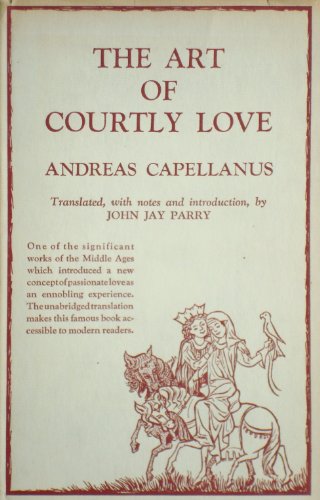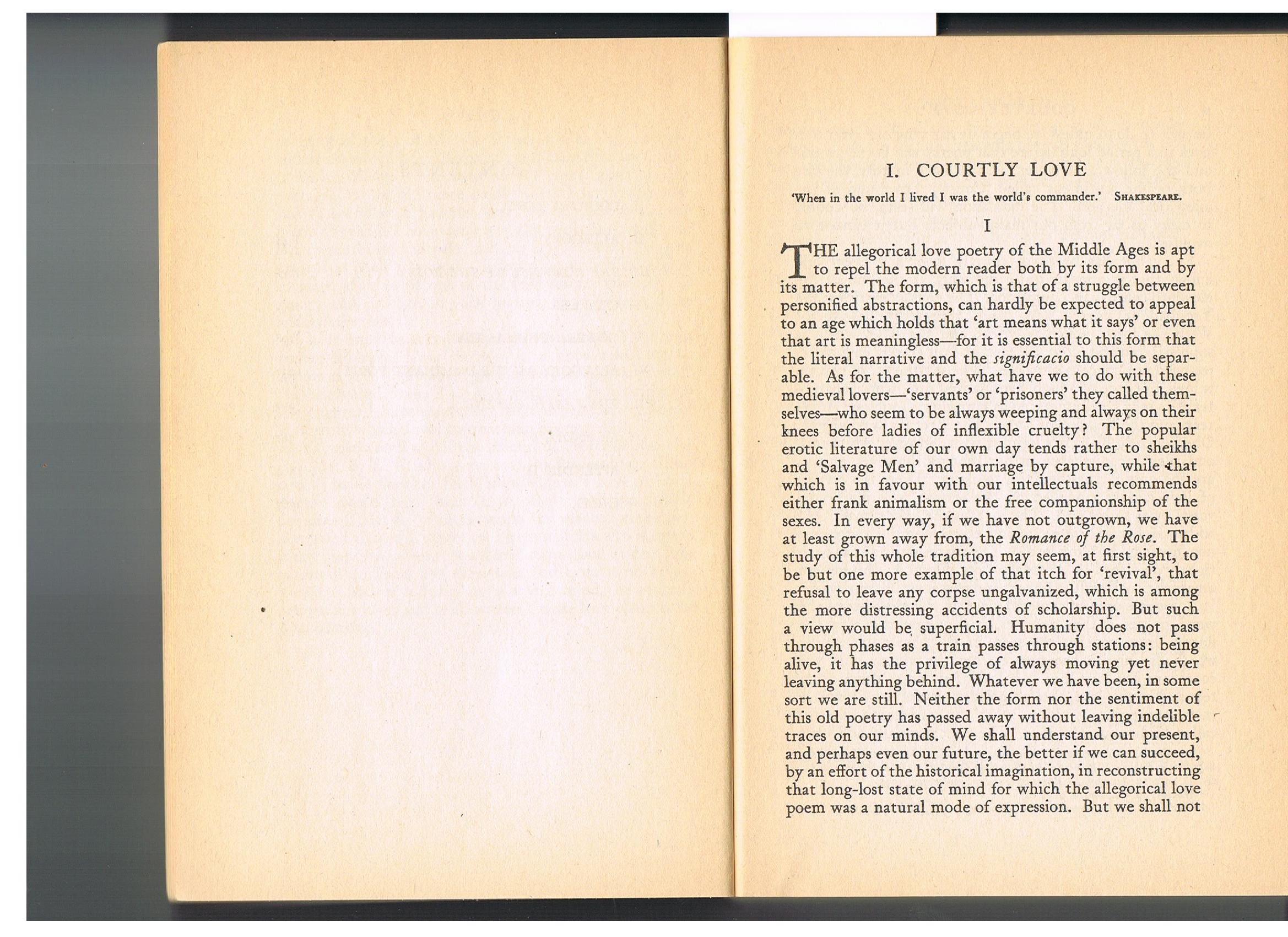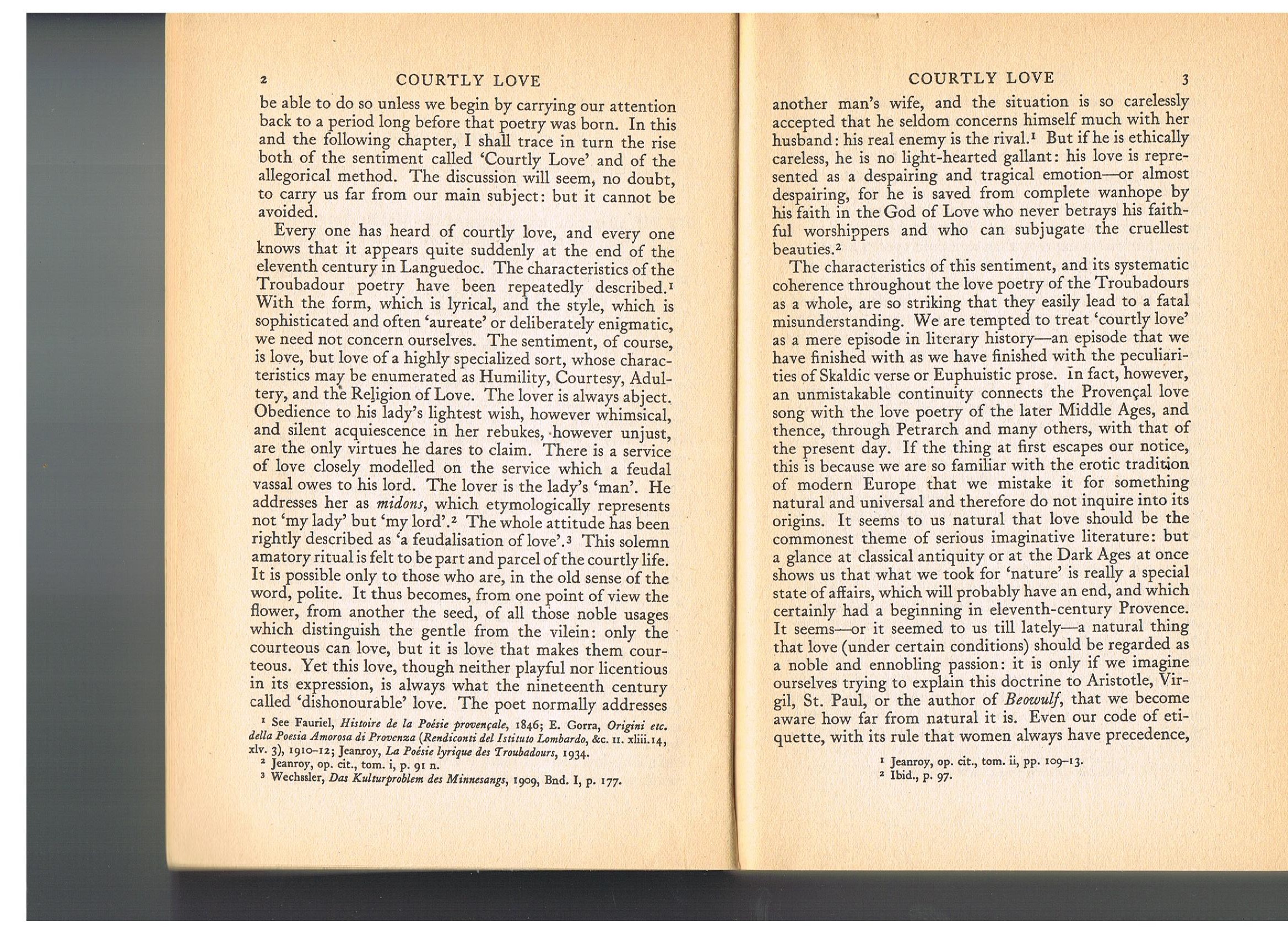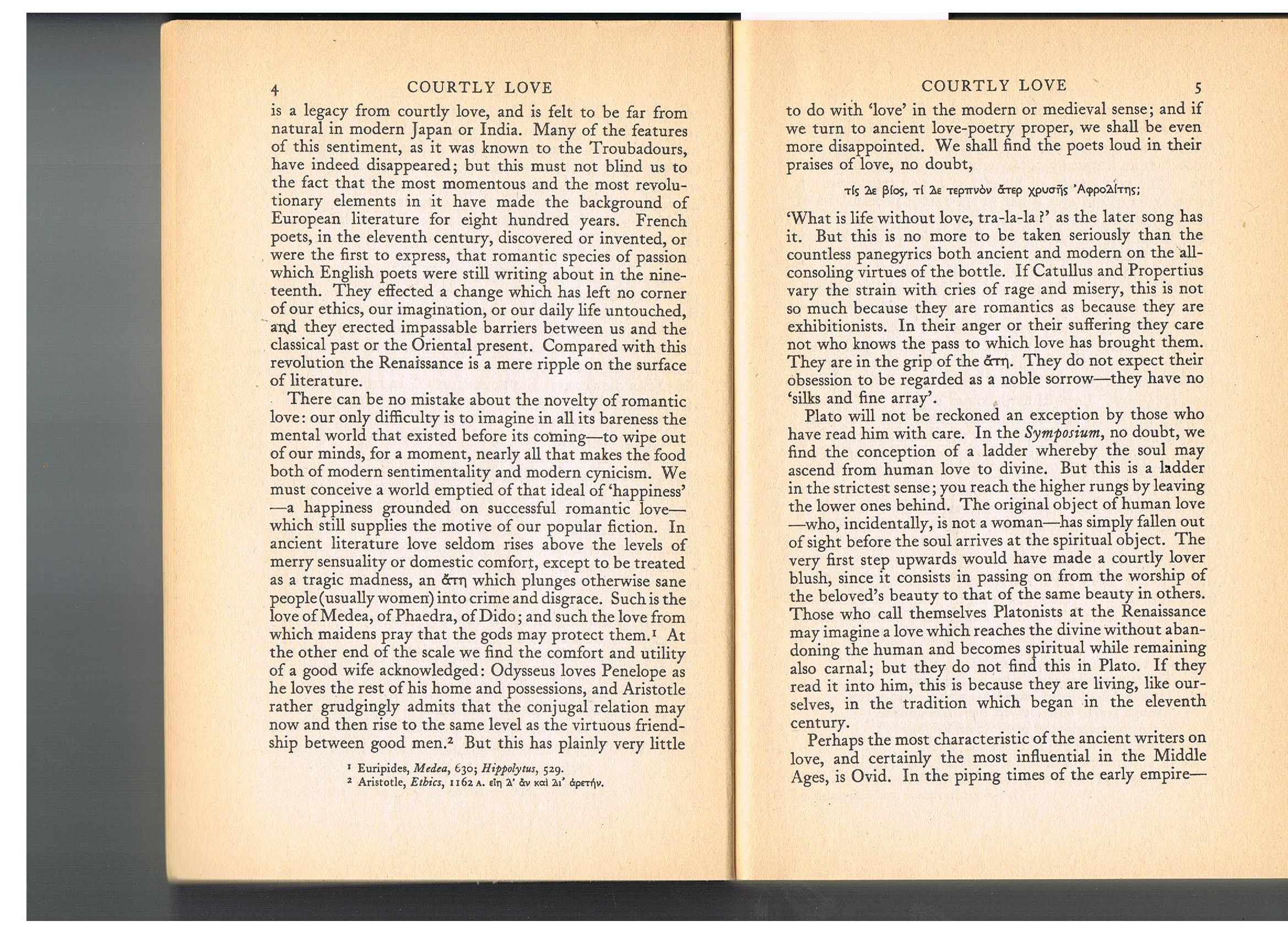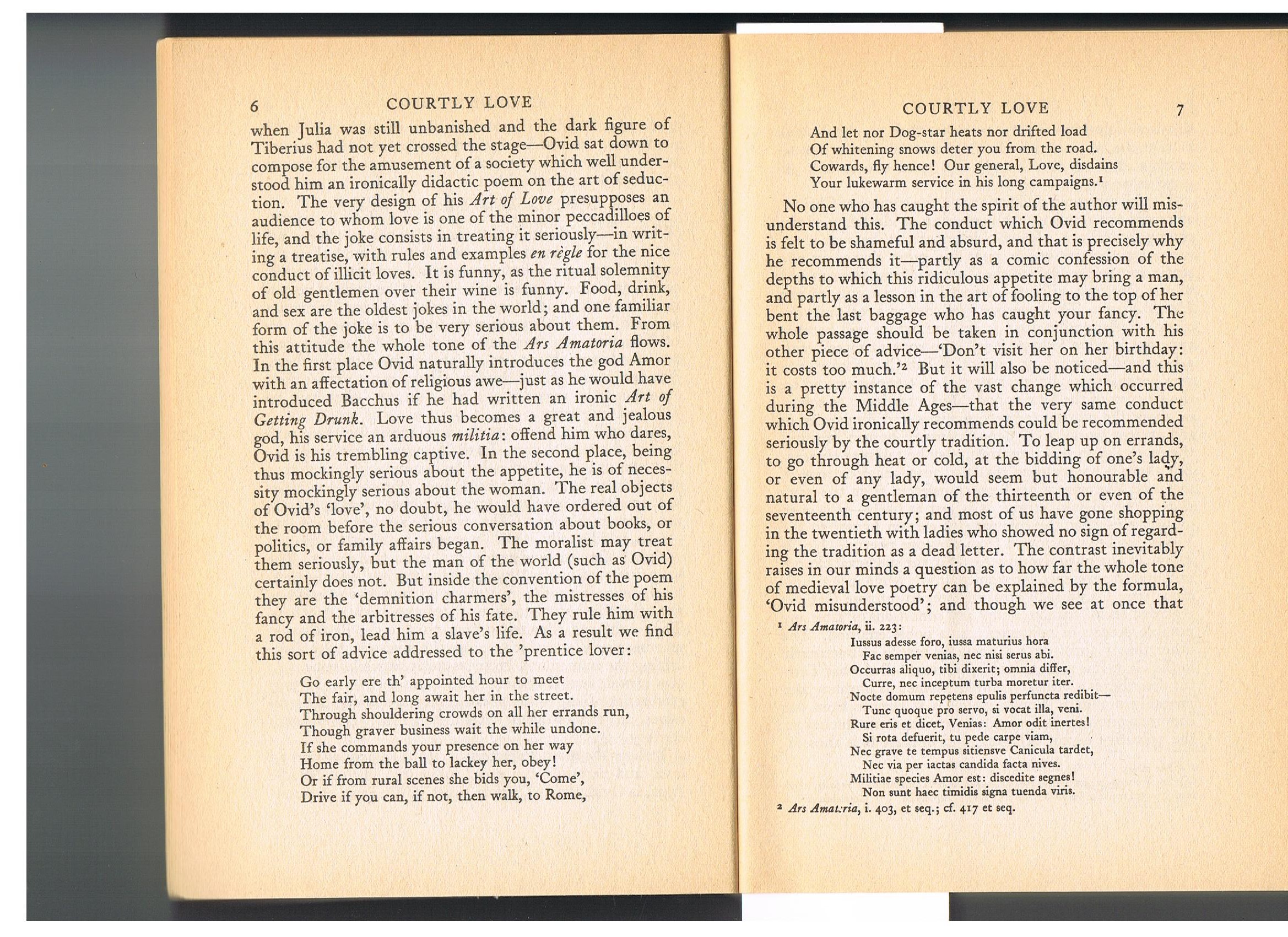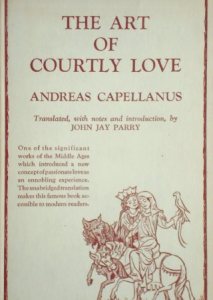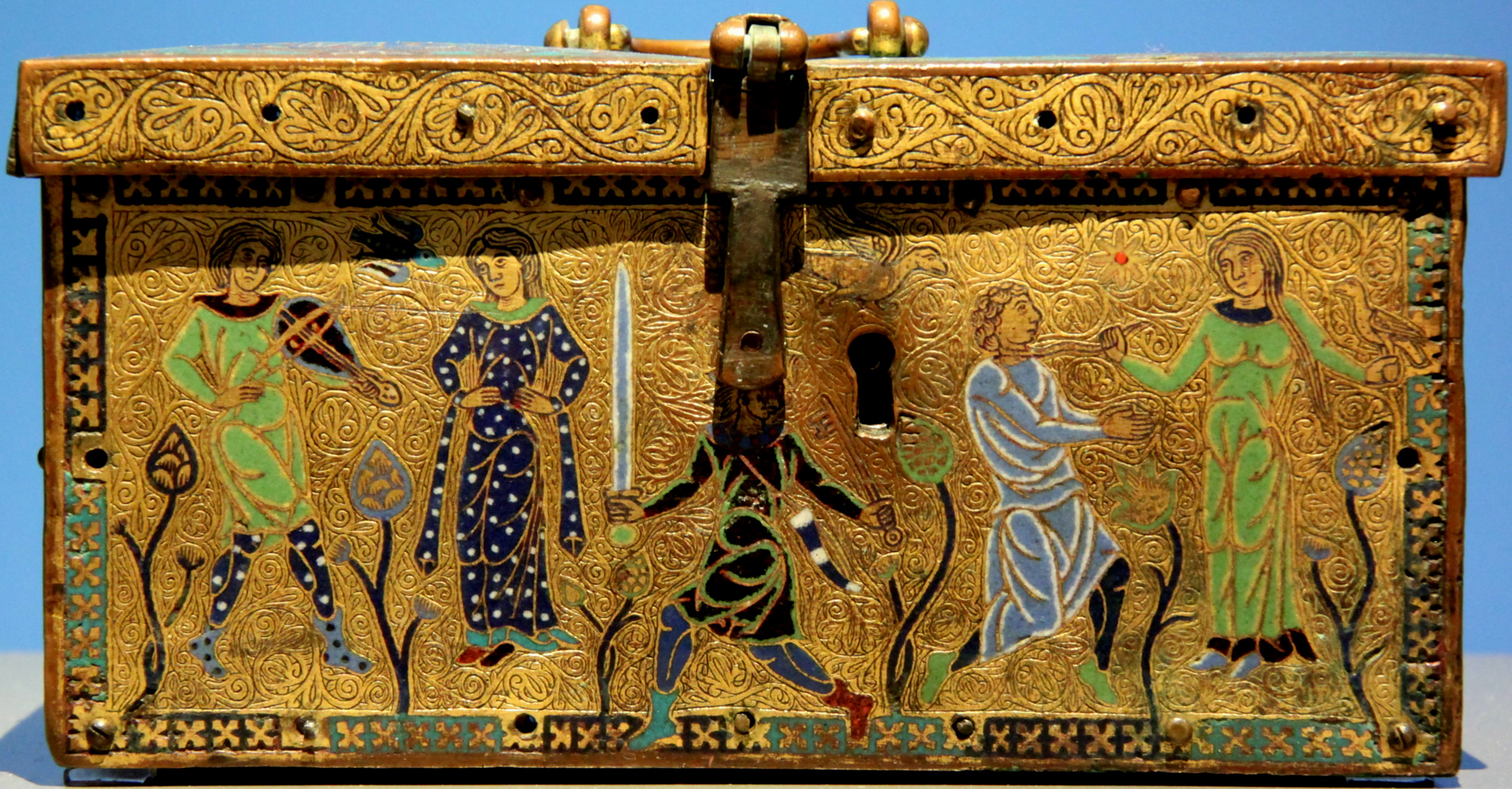The Art of Courtly Love (Twelfth Century)
The Art of Courtly Love was written by Andreas Capellanus in 1190. The volume falls into three large units or “books.” Book One, “Introduction to the Treatise on Love,” defines love as “a certain inborn suffering derived from the sight of and excessive meditation upon the beauty of the opposite sex, which causes each one to wish above all things the embraces of the other.” There is no question that love is suffering, says Andreas, because “before the love becomes equally balanced on both sides there is no torment greater, since the lover is always in fear that his love may not gain its desire.”
True love is an ennobling experience, for it can endow a man with nobility of character, can cause a proud man to be humble, and can cause a selfish man to perform many graceful services:
O what a wonderful thing is love, which makes a man shine with so many virtues and teaches everyone, no matter who he is, so many good traits of character! . . . It adorns a man, so to speak, with the virtue of chastity, because he who shines with the light of one love can hardly think of embracing another woman, even a beautiful one. For when he thinks deeply of his beloved the sight of any other woman seems to his mind rough and rude.
Much of Book One is a series of dialogues showing how a man of one class might speak of his love with a woman of his own or another class. Here are excerpts from the “seventh dialogue,” one in which a man of the higher nobility speaks with a woman of the simple nobility. He has not before met the woman, but he has heard her praised by others:
THE MAN SAYS: I ought to give God greater thanks than any other living man in the whole world because it is now granted me to see with my eyes what my soul has desired above all else to see. . . . And I now know in very truth that a human tongue is not able to tell the tale of your beauty and your prudence. . . . And I wish ever to dedicate to your praise all the good deeds that I do and to serve your reputation in every way. For whatever good I may do, you may know that it is done with you in mind. . . .
THE WOMAN SAYS: I am bound to give you many thanks for lauding me with such commendations and exalting me with such high praise . . . I am therefore glad if I am to you a cause and origin of good deeds, and so far as I am able I shall always and in all things give you my approval when you do well. . . .
THE MAN SAYS: I have chosen you from among all women to be my mighty lady, to whose services I wish ever to devote myself and to whose credit I wish to set down all my good deeds. From the bottom of my heart I ask you mercy, that you may look upon me as your particular man, just as I have devoted myself particularly to serve you, and that my deeds may obtain from you the reward I desire. . . .
THE WOMAN SAYS: Your request that I should consider you as my particular man, just as you are particularly devoted to my service, and that I should give you the reward you hope for, I do not see how I can grant, since such partiality might be to the disadvantage of others who have as much desire to serve me as you have, or perhaps even more. Besides I am not perfectly clear as to what the reward is that you expect from me; you must explain yourself more clearly. . . .
THE MAN SAYS: The reward I ask you to promise to give me is one which it is unbearable agony to be without, while to have it is to abound in all riches. It is that you should be pleasant to me unless your desire is opposed to me. It is your love which I seek, in order to restore my health.. . .
THE WOMAN SAYS: You seem to be wandering a long way from the straight path of love and to be violating the best custom of lovers, because you are in such haste to ask for love. For the wise and well-taught lover, when conversing for the first time with a lady whom he has not previously known, should not ask in specific words for the gifts of love. We are separated by too wide and too rough an expanse of country to be able to offer each other love’s solaces or to find proper opportunities for meeting. Lovers who live near together can cure each other of the torments that come from love. . . . Therefore everybody should try to find a lover who lives near by.
The woman argues that love really can exist between husband and wife. Neither she nor he will yield on this crucial point, and in the end they submit the matter to the Countess of Champagne and agree to abide by her ruling on this question. She replies to the woman’s letter in one dated May 1, 1174: “We declare and we hold as firmly established that love cannot exert its powers between two people who are married to each other. For lovers give each other everything freely, under no compulsion of necessity, but married people are in duty bound to give in to each other’s desires and deny themselves to each other in nothing.”
Here are excerpts from the “eighth dialogue,” one in which a man and woman both of the higher nobility enter into a dialogue. Andreas states that if a man of higher nobility should seek the love of a woman of the same class, he should first above all things follow the rule to use soft and gentle words, and he should take care not to say anything that would seem to deserve reproof. For a noblewoman or a woman of higher nobility is found to be very ready and bold in censuring the deeds or the words of a man of the higher nobility, and she is very glad if she has a good opportunity to say something to ridicule him.
THE MAN SAYS: Indeed it is true that god has inclined all good men in this life to serve your desires and those of other ladies, and it seems to me that this is for the very clear reason that men cannot amount to anything nor taste of the fountain of goodness unless they do this under the persuasion of ladies… It is clear that every man should strive with all his might to be of service to ladies so that he may shine by their grace. But ladies are greatly obligated to keeping the hearts of good men set upon doing good deeds and to honor every man according to his deserts. For whatever good things living men may say or do, they generally credit them all to to the praise of women, and by serving women they so act that they may pride themselves on the rewards they receive from them, and without these rewards no man can be of use in this life or be considered worthy of any praise. Now I know many men who are sure they have been given perfect love, and I know others who are maintained only by the milk of nourishing hope; but I, who have neither perfect love nor the gift of hope, am more sustained merely by the pure thought of you, which I do have, than all other lovers are by unnumbered solaces. May your pity therefore turn and regard my solitary thought and give it a little increase. And truly I beg you must earnestly not try to keep away from Love’s court, for those who stay away from the palace of Love live for themselves alone, and no one gets any profit from their lives…
THE WOMAN SAYS: Although your words are deep and profound and reach to the walls of Love’s subtlety, I shall try, as far as I am able, to give them a fitting answer. And because the experience of Cicero tells us that the things which are said last in a discourse are more readily retained in the memory, I shall try to answer your last remarks first. Now your urging me to strive to do what might increase my good character and that of others was pleasing and acceptable enough to me, because I had it in my heart to do that without advice from anyone. And I know women should, as you have asserted, be the cause and origin of good things… and should persuade every man to do courteous deeds and to avoid everything that has the appearance of boorishness and not to be so tenacious of his own property as to blacken his good name. But to show love is to gravely offend God and to prepare for many the perils of death. And besides it seems to bring innumerable pains to the lovers themselves and to cause them constant torments every day… I myself have had no experience in love and so naturally I can tell you nothing about its nature except so far as I have learned about it from what others tell me.
THE MAN SAYS: It is the pure love which binds together the hearts of two lovers with feelings of delight. This kind consists in the contemplation of the mind and the affection of the heart; it goes as far as the kiss and the embrace and the modest contact with the nude lover, omitting the final solace. . . . But that is called mixed love which gets its effect from every delight of the flesh and culminates in the final act of Venus. . . . This kind quickly fails, and one often regrets having practiced it; by it one’s neighbor is injured, the Heavenly King is offended, and from it come very grave dangers. But I do not say this as though I meant to condemn mixed love, I merely wish to show which of the two is preferable. But mixed love, too, is real love, and it is praiseworthy, and we say that it is the source of all good things, although from it grave dangers threaten, too. Therefore I approve of both pure love and mixed love, but I prefer to practice pure love. . . .
THE WOMAN SAYS: Since a certain woman of the most excellent character wished to reject one of her two suitors by letting him make his own choice, and to accept the other, she divided the solaces of love in her in this fashion. She said, “Let one of you choose the upper half of me, and let the other suitor have the lower half.” Without a moment’s delay each of them chose his part, and each insisted that he had chosen the better part. . . . I ask you which seems to you to have made the more praiseworthy choice.
THE MAN SAYS: Who doubts that the man who chooses the solaces of the upper part should be preferred to the one who seeks the lower? For so far as the solaces of the lower part go, we are in no wise differentiated from brute beasts; but in this respect nature joins us to them. But the solaces of the upper part are, so to speak, attributes peculiar to the nature of man and are by this same nature denied to all the other animals. Therefore the unworthy man who chooses the lower part should be driven out from love just as though he were a dog, and he who chooses the upper part should be accepted as one who honors nature. Besides this, no man has ever been found who was tired of the solaces of the upper part, or satiated by practicing them, but the delight of the lower part quickly palls upon those who practice it, and it makes them repent of what they have done.
From Book II of The Art of Courtly Love, entitled “How Love May be Retained,” I shall quote only a few of the 31 “rules of love which the King of Love himself, with his own mouth, pronounced for lovers”:
1. Marriage is no real excuse for not loving.
2. He who is not jealous cannot love.
10. Love is always a stranger in the home of avarice.
11. It is not proper to love any woman whom one should be ashamed to seek to marry.
13. When made public, love rarely endures.
14. The easy attainment of love makes it of little value; difficulty of attainment makes it prized.
15. Every lover regularly turns pale in the presence of his beloved.
16. When a lover suddenly catches sight of his beloved his heart palpitates.
17. A new love puts to flight an old one.
19. If love diminishes, it quickly fails and rarely revives.
20. A man in love is always apprehensive.
21. Real jealousy always increases the feeling of love.
22. Jealousy, and therefore love, are increased when one suspects his beloved.
23. He whom the thought of love vexes, eats and sleeps very little.
27. A lover can never have enough of the solaces of his beloved.
28. A slight presumption causes a lover to suspect his beloved.
29. A true lover is constantly and without intermission possessed by the thought of his beloved.
Primary source: Andreas Capellanus, The Art of Courtly Love, translated by John Jay Parry (New York, Columbia University Press, 1941). [FULL TEXT]
Some introductory remarks above by Peter G. Beidler, – from Backgrounds to Chaucer,
